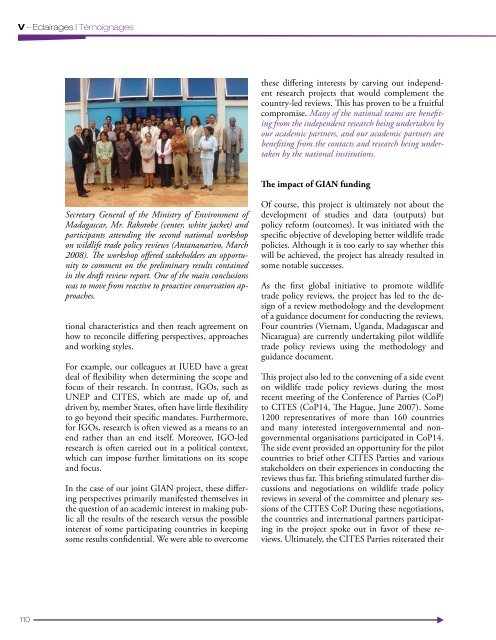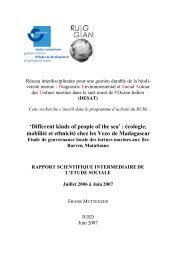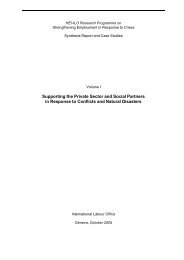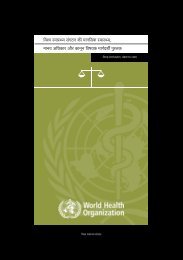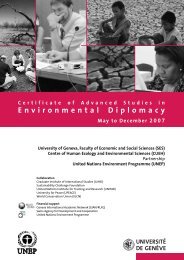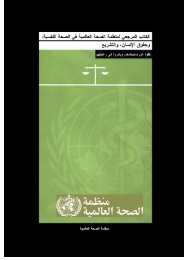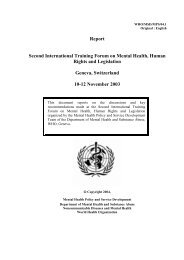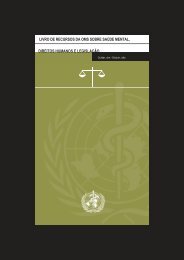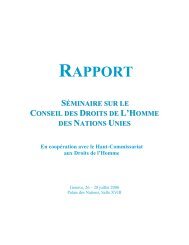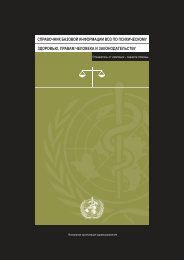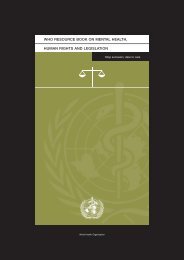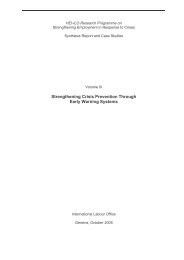Les liaisons fructueuses - RUIG-GIAN
Les liaisons fructueuses - RUIG-GIAN
Les liaisons fructueuses - RUIG-GIAN
You also want an ePaper? Increase the reach of your titles
YUMPU automatically turns print PDFs into web optimized ePapers that Google loves.
V – Eclairages | Témoignages<br />
these differing interests by carving out independent<br />
research projects that would complement the<br />
country-led reviews. This has proven to be a fruitful<br />
compromise. Many of the national teams are benefiting<br />
from the independent research being undertaken by<br />
our academic partners, and our academic partners are<br />
benefiting from the contacts and research being undertaken<br />
by the national institutions.<br />
The impact of <strong>GIAN</strong> funding<br />
Secretary General of the Ministry of Environment of<br />
Madagascar, Mr. Rakotobe (center, white jacket) and<br />
participants attending the second national workshop<br />
on wildlife trade policy reviews (Antananarivo, March<br />
2008). The workshop offered stakeholders an opportunity<br />
to comment on the preliminary results contained<br />
in the draft review report. One of the main conclusions<br />
was to move from reactive to proactive conservation approaches.<br />
tional characteristics and then reach agreement on<br />
how to reconcile differing perspectives, approaches<br />
and working styles.<br />
For example, our colleagues at IUED have a great<br />
deal of flexibility when determining the scope and<br />
focus of their research. In contrast, IGOs, such as<br />
UNEP and CITES, which are made up of, and<br />
driven by, member States, often have little flexibility<br />
to go beyond their specific mandates. Furthermore,<br />
for IGOs, research is often viewed as a means to an<br />
end rather than an end itself. Moreover, IGO-led<br />
research is often carried out in a political context,<br />
which can impose further limitations on its scope<br />
and focus.<br />
In the case of our joint <strong>GIAN</strong> project, these differing<br />
perspectives primarily manifested themselves in<br />
the question of an academic interest in making public<br />
all the results of the research versus the possible<br />
interest of some participating countries in keeping<br />
some results confidential. We were able to overcome<br />
Of course, this project is ultimately not about the<br />
development of studies and data (outputs) but<br />
policy reform (outcomes). It was initiated with the<br />
specific objective of developing better wildlife trade<br />
policies. Although it is too early to say whether this<br />
will be achieved, the project has already resulted in<br />
some notable successes.<br />
As the first global initiative to promote wildlife<br />
trade policy reviews, the project has led to the design<br />
of a review methodology and the development<br />
of a guidance document for conducting the reviews.<br />
Four countries (Vietnam, Uganda, Madagascar and<br />
Nicaragua) are currently undertaking pilot wildlife<br />
trade policy reviews using the methodology and<br />
guidance document.<br />
This project also led to the convening of a side event<br />
on wildlife trade policy reviews during the most<br />
recent meeting of the Conference of Parties (CoP)<br />
to CITES (CoP14, The Hague, June 2007). Some<br />
1200 representatives of more than 160 countries<br />
and many interested intergovernmental and nongovernmental<br />
organisations participated in CoP14.<br />
The side event provided an opportunity for the pilot<br />
countries to brief other CITES Parties and various<br />
stakeholders on their experiences in conducting the<br />
reviews thus far. This briefing stimulated further discussions<br />
and negotiations on wildlife trade policy<br />
reviews in several of the committee and plenary sessions<br />
of the CITES CoP. During these negotiations,<br />
the countries and international partners participating<br />
in the project spoke out in favor of these reviews.<br />
Ultimately, the CITES Parties reiterated their<br />
110


